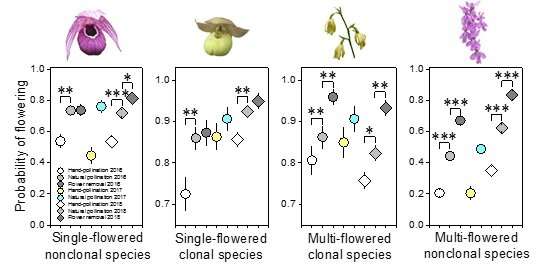The effect of reduced (flower removal) and increased (hand-pollination) reproductive effort on flowering performance of four coexisting species in three consecutive years. Credit: IBCAS
Using a multi-species experimental approach, researchers from the Institute of Botany of the Chinese Academy of Sciences (IBCAS) have recently found that trade-off between current reproduction and future performance was associated with flowering strategy and clonality. Results were published in the Journal of Ecology.
The researchers used an ideal system, including four species of coexisting nectarless orchids, of which two species are nonclonal (Cypripedium tibeticum and Ponerorchis chusua), two are clonal (C. flavum and Phaius delavayi), and each growth form includes a single- and a multi-flowered species.
By experimentally increasing and reducing reproductive effort over three years, the researchers observed that compared with reduction in reproduction by flower removal, natural reproduction significantly reduced growth and fecundity, whereas increase in fruit production by hand-pollination additionally reduced sprouting probability.
They further found that demographic costs were clearly stronger in multi-flowered species compared with single-flowered ones, but the pattern was less clear regarding clonality. Contrary to predictions, costs were independent of clone size in clonal species.
Higher biomass allocation to reproductive parts and a longer flowering period may explain high costs of reproduction observed in multi-flowered species.
"Trade-off is an important issue in evolutionary biology and many studies have investigated spatial and temporal environmental effects on it. But this study is one of a few to detect trait-dependent life history trade-offs, and thus provides new data for understanding life history evolution," said Dr. Sun Hai-Qin, correspondence author of the study.
More information: Hai‐Qin Sun et al, The expression of demographic costs of reproduction varies among coexisting plants with different life history traits, Journal of Ecology (2022). DOI: 10.1111/1365-2745.13951
Journal information: Journal of Ecology
Provided by Chinese Academy of Sciences
























